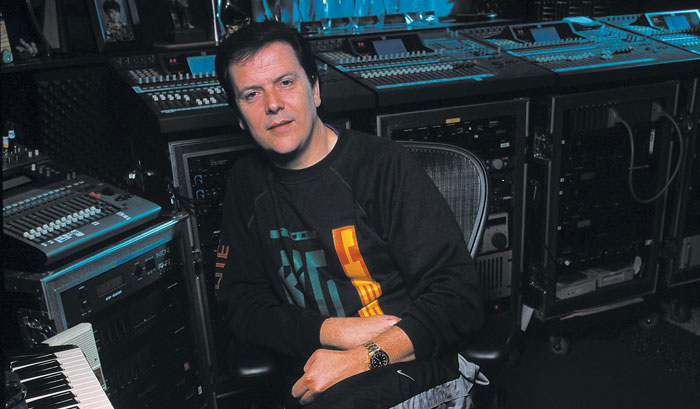


Composer Trevor Rabin makes success look simple. Rabin has proven himself three times over. Before leaving his native South Africa, he played with the band Rabbit, whose regional popularity rivaled that of the Beatles. Soon after he started working in America and the U.K., his songwriting, production, and guitar virtuosity helped spur the veteran progressive-rock group Yes to its greatest commercial successes. And shortly after amicably exiting Yes, he established himself as one of Hollywood's most in-demand film composers.
"Yes and I had a phenomenal relationship, and I'm still friends with the band," insists Rabin. "But after 15 years it started to feel a little like the same old same old. It was great, but I was ready for another sort of challenge." he subsequently scored such big-screen blockbusters as Con Air, The Deep Blue Sea, The One, and Gone in 60 Seconds.
Nowadays directors expect you to mock up the score to an incredible degree via MIDI.
Rabin finds it ironic that some ill-informed observers see him as a rock interloper faking it in film scoring. "It's funny," he muses. "When I was in Yes and Rabbit, people would accuse me of being a classical musician pretending to be a rock star. And then when I started doing movies, they said, 'he's a rock star trying to be a composer!'"
In fact, Rabin has always straddled the two worlds. He credits part of his eclecticism to his father, a violinist who led the Johannesburg Symphony for many years, who also had a sympathetic ear for rock. "He was a phenomenally well-educated musician," says Trevor. "But I'd sometimes come home after a Rabbit gig and find him listening to Jimi Hendrix's Electric Ladyland with headphones." Trevor himself studied theory, composition, and conducting with noted teacher Walter Mony.
Now, Rabin creates much of his music on a computer in his studio, though blazing guitars still figure strongly in some of his scores. "I do all the writing here and record almost everything except orchestras," he explains. "But I'm usually going for an orchestral sound long before we record the orchestra, because nowadays directors expect you to mock up the score to an incredible degree via MIDI. It has to be fully arranged and realized so that it sounds almost identical to what it will sound like with orchestra. In fact, there have been times when directors have become so used to hearing the demo that they opted to use it even after having spent sixty grand on an orchestral session."
The centerpiece of Rabin's studio is a set of Yamaha digital recording consoles. "I have four 02Rs because I need so many channels, and they link up so phenomenally well," explains Trevor. "I also have a Yamaha 01V mixer I use as a monitor system. Everything runs through the Yamahas' 24-bit A/D converters. The sound quality is phenomenally transparent, and the EQ is a lot more forgiving than on a lot of vintage consoles. In fact, the 02Rs are just about the only part of the chain that never causes problems."
Rabin makes full use of the consoles' ability to store and recall mixes. "That feature is so essential to what I do," he says. "Every cue has a different patch, with its own EQ, compression, and reverbs, and there are typically 40 to 50 cues per movie. I just write the program changes into the sequencer, and it tells the 02R to go to the specific program for that cue."
Trevor's latest scores have been created in 5.1 surround mode. "I've always envisioned music in those terms," he says, "so it's great to be able to actually write that way. It's good for keeping music from clashing with sound effects, and when you have an essential melody that occurs over dialog, there's the option of placing it far in the back so it gets out of the way."
Rabin established himself with brash, guitar-driven action scores, but he's made a point to expand his repertoire with such departures as the all-orchestral Remember the Titans, the Roots-flavored Home Grown, and the African-influenced Whispers. Trevor revels in the displaying his range. "As long as there's diversity," he says, "I'm happy."
























